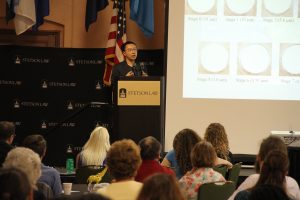Global climate change: where does science meet policy?
Stetson University Associate Professor of Chemistry Song Gao, Ph.D., discussed the impacts of global climate change with the College of Law community and members of the public on Feb. 27.
Dr. Song Gao presented on “Atmospheric Aerosols, Super Greenhouse Gases, Global Climate Change: Where Science Meets Policy” as part of Stetson’s Foreman Biodiversity Lecture series.
“I think the take home message is that the earth’s atmospheric temperature has been rising rapidly, especially in the last three to four decades, and that is primarily due to the emissions of greenhouse gases by humans. The projection is that in the future the climate will continue to warm,” said Dr. Gao. “I think we’re at a critical moment. When science and policy truly meet, we can come up with science-based, forward-looking solutions to mitigate climate change. The Montreal Protocol has set a beautiful example that collectively, we can do something positive to the environment: mitigating the ozone hole based on ozone chemistry mechanisms. Hopefully, we can come up with wise solutions to mitigate the ongoing climate change by limiting the emissions of both short-lived climate forcers, such as HFCs, which the Kigali Amendment is starting to regulate, and long-lived climate forcers, such as CO2.
The Institute for Biodiversity Law and Policy at Stetson regularly coordinates a series of public lectures on environmental law and policy topics impacting people locally and globally. The next lecture in the series is scheduled for noon on March 30 in the Great Hall at Stetson law school’s Gulfport campus.
Post date: Feb. 28, 2017
Media contact: Kate Bradshaw
[email protected] | 727-430-1580
